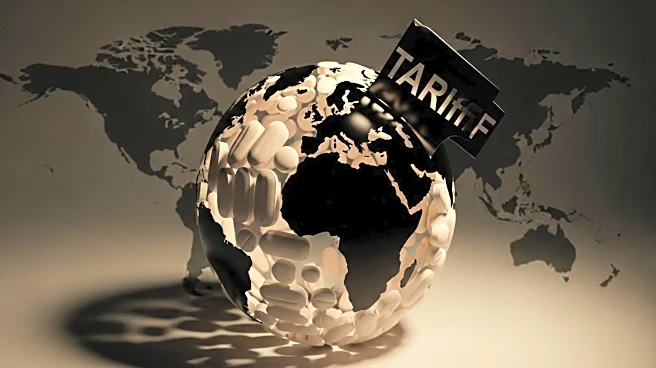What is the story about?
What's Happening?
President Trump has announced a 100-percent tariff on all branded, imported pharmaceutical products unless companies are constructing manufacturing plants in the United States. This move is part of a broader trade strategy aimed at encouraging domestic production. The tariffs are set to take effect in five days, prompting analysts to assess the potential impact on various nations and pharmaceutical firms. While generic drugs are exempt from these tariffs, branded and patented drugs, particularly those produced in Europe, are at risk. The European Union claims a previous trade deal shields it from these tariffs, but uncertainty remains for other countries like Switzerland and Denmark, which are home to major pharmaceutical companies.
Why It's Important?
The imposition of these tariffs could significantly disrupt the global pharmaceutical supply chain, increasing costs and potentially limiting access to essential medications in the U.S. This move could pressure international pharmaceutical companies to shift production to the U.S., impacting their operational strategies and financial planning. Countries like Switzerland and Denmark, which are not covered by the EU's trade deal, face economic risks due to their reliance on pharmaceutical exports. The tariffs could also strain diplomatic relations as affected countries seek to negotiate exemptions or alternative solutions.
What's Next?
Pharmaceutical companies are likely to accelerate their plans to establish or expand manufacturing facilities in the U.S. to avoid the tariffs. This could lead to increased investment in U.S. infrastructure and job creation in the sector. However, the timeline for constructing new facilities may not align with the immediate tariff imposition, creating short-term challenges. Affected countries and companies may engage in diplomatic negotiations with the U.S. to seek exemptions or delay the implementation of the tariffs.
Beyond the Headlines
The tariffs highlight the ongoing tension between protectionist trade policies and global supply chain dependencies. This development could lead to a reevaluation of international trade agreements and the role of government intervention in global markets. The pharmaceutical industry may need to adapt to a more fragmented production landscape, balancing cost efficiencies with geopolitical considerations.















